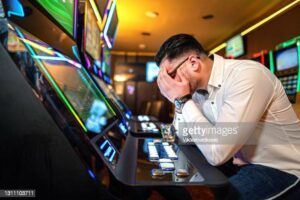Overview
Compulsive gambling, often known as gambling disorder, is an irrepressible need to keep gambling despite the negative consequences. Gambling is defined as putting something of worth on the line in the hopes of obtaining something of even greater value.
Gambling, like narcotics or alcohol, may trigger the brain’s reward system, leading to addiction. If you have a compulsive gambling issue, you may continue to pursue losses, disguise your conduct, deplete funds, acquire debt, or even turn to theft or fraud to maintain your addiction.
Compulsive gambling is a terrible disorder that has the potential to destroy lives. Although addressing compulsive gambling might be difficult, it is possible.
Gambling is one of the most deceptive human vices since it gives the appearance of easy money while swiftly leading to financial disaster. Whether it’s poker, blackjack, or anything else, the odds are always in the house’s favor; gambling is a profitable industry because the house always wins. Continue reading to learn about the signs, causes, and consequences of gambling addiction.
Compulsive gambling is a terrible disorder that may ruin people’s life. Although treating compulsive gambling can be difficult, many individuals who battle with compulsive gambling have found assistance through proficient treatment.
what causes an addiction to gambling?
Many variables, including financial desperation, a craving for thrills and highs, the social prestige associated with being a successful gambler, and the stimulating environment of the mainstream gaming scene, can all contribute to gambling addiction. Unfortunately, once a gambling addiction has taken hold, it is tough to interrupt the habit.
Severe addictions can develop when a person is eager for money and seeks to recoup their losses. When the individual ultimately wins, while they may wind up with a large sum of money, it is rarely enough to compensate for what they have already lost. The vast majority of gamblers never even come close to breaking even.
Affordable therapy delivered digitally – Try online-therapy
Choose from online-therapy’s vast network of therapists for your therapy needs. Take a quiz, get matched, and start getting support via secure phone or video sessions. Sign Up now and get 20% off.
Signs of a Gambling addiction ?
The symptoms of a gambling issue are frequently the same as those of other addictions. Addiction symptoms include, but are not limited to, the following:
- gambling When you can’t afford to gamble
- Feeling the urge to keep gaming a secret
- Having difficulty managing your gambling tendencies
Of course, the hallmark symptom of a gambling issue, as with any other addiction, is that you believe you can’t quit. If you feel the desire to try just one more time, or if the thought of stopping makes you uncomfortable, you are most certainly suffering from a gambling addiction. If you believe you or a loved one may be suffering from a gambling addiction, contact us to discuss the indicators of gambling addiction and your specific circumstances.
Symptoms of Gambling addiction
Excessive gambling frequently results in a wide range of mental symptoms, including anxiety, sadness, and suicidal thoughts and impulses. In severe cases, these ideas may lead a gambler to make a suicide attempt. Losing everything to gambling is painful, and many individuals feel absolutely helpless.
- Being obsessed with gambling, such as continuously thinking about ways to earn more gaming money
- Having to bet with increasing quantities of money in order to get the same excitement
- Attempting to limit, reduce, or quit gambling without success
- When you try to cut back on gambling, you may feel restless or agitated.
- Gambling to distract oneself from issues or to alleviate feelings of helplessness, guilt, worry, or melancholy
- Attempting to recoup lost funds by gambling more (chasing losses)
- Lying to family members or others to conceal your gambling habits
- Putting crucial connections, a career, or education or employment chances in jeopardy or losing them as a result of gambling
- Using theft or fraud to get gaming funds
- You’re asking people to bail you out of financial problems because you gambled away your money
People with a compulsive gambling issue are motivated to keep playing to recoup their money, unlike most casual gamblers who quit when they lose or establish a loss limit. a habit that grows progressively harmful over time.
Some compulsive gamblers may experience remission, in which they gamble less or not at all for a period of time. However, without therapy, the remission is generally temporary.
When to see a doctor or mental health professional ?
Has anyone in your family, friends, or coworkers voiced worry about your gambling? If this is the case, pay attention to their concerns. Because denial is usually always a component of compulsive or addictive behavior, you may find it difficult to recognize that you have a problem.
Seek expert treatment if you identify your own conduct from the list of signs and symptoms of compulsive gambling.
Affordable therapy delivered digitally – Try online-therapy
Choose from online-therapy’s vast network of therapists for your therapy needs. Take a quiz, get matched, and start getting support via secure phone or video sessions. Sign Up now and get 20% off.
Risk factors
- Mental health disorders: Compulsive gamblers frequently have drug abuse issues, personality disorders, depression, or anxiety. Compulsive gambling has been linked to bipolar illness, obsessive-compulsive disorder (OCD), and attention-deficit/hyperactivity disorder (ADHD).
- Age: Gambling addiction is more frequent among young and middle-aged adults. Gambling throughout childhood or adolescence raises the likelihood of developing compulsive gambling. Compulsive gambling, on the other hand, maybe a concern among the elderly population.
- Sex: Men are more likely than women to suffer from compulsive gambling. Women who gamble tend to begin later in life and may become addicted more rapidly. However, men’s and women’s gambling habits are becoming increasingly comparable.
- Influence from family or friends: If any of your family members or acquaintances have a gambling addiction, the odds are that you will as well.
- Medications for Parkinson’s disease and restless legs syndrome: Dopamine agonists are drugs that have an uncommon adverse effect that might cause compulsive behaviors, including gambling, in certain persons.
- Certain traits of personality: Being very competitive, a workaholic, impetuous, restless, or quickly bored may raise your chances of developing compulsive gambling.
Complications
- Relationship issues
- Financial difficulties, including bankruptcy
- Legal issues or incarceration
- Inadequate job performance or job loss
- General ill health
- Suicide, attempted suicide, or suicidal ideation
Prevention
Although there is no established method for preventing gambling addiction, educational programs aimed at people and groups at high risk may be beneficial.
If you have risk factors for compulsive gambling, you should avoid gambling in any form, as well as persons who gamble and venues where gambling takes place. Get therapy as soon as you notice a problem to help prevent it from worsening.

